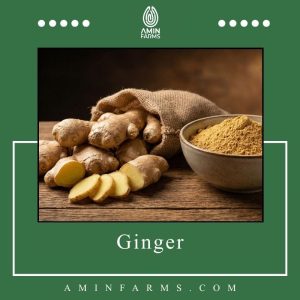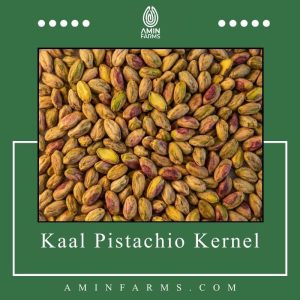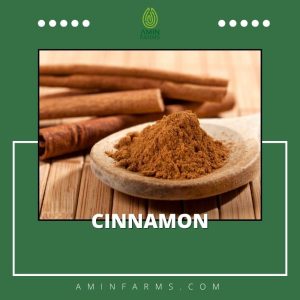How to Successfully Import Dates from Iran
- Ebrahim Bahrololoum
- No Comments
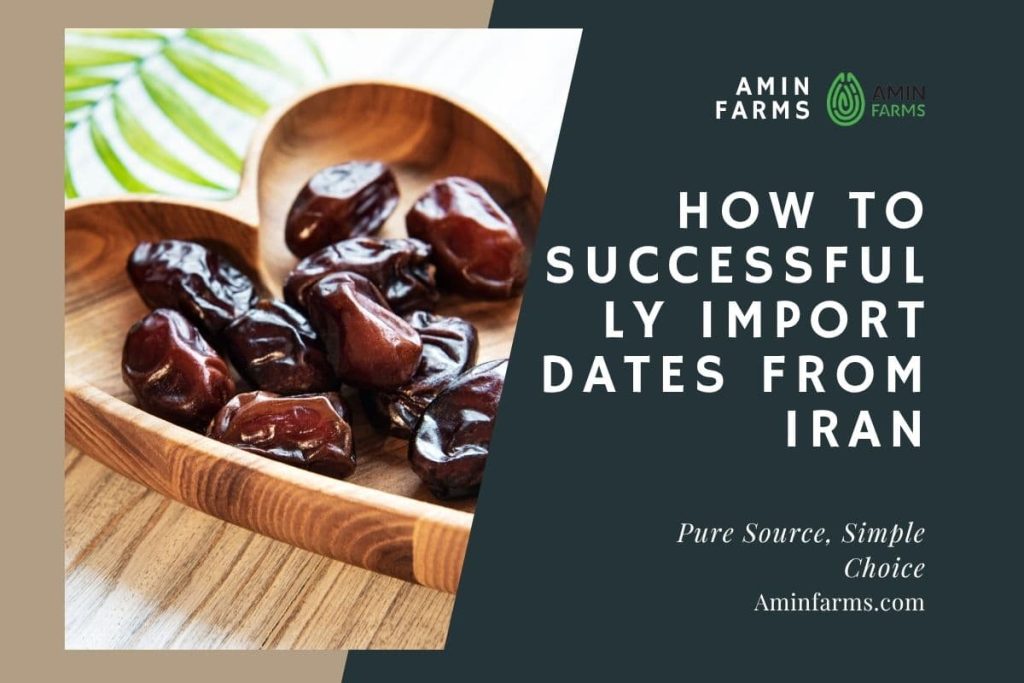
Iranian dates are more than just a fruit; they’re a story of flavor, tradition, and craftsmanship. With their rich taste, distinctive texture, and remarkable nutritional value, they’ve become a favorite among consumers worldwide. Iran is a major global player, offering a wide range of premium varieties, including Piarom, the most luxurious export, and Mazafati, the best-loved option. For international buyers seeking quality and profit, importing dates from Iran is a truly golden opportunity.
Yet, the path to success isn’t always straightforward. From navigating strict health and packaging standards to managing cold-chain logistics and securing trustworthy suppliers, each step requires care and know-how. Many companies stumble early simply because they’re unaware of crucial details.
This article clears the fog and gives you a practical roadmap. If you’re ready to import dates from Iran professionally and confidently, you’re in precisely the right place to begin.
Free Import & Export Consultation
Step-by-Step Guide to Import Dates from Iran
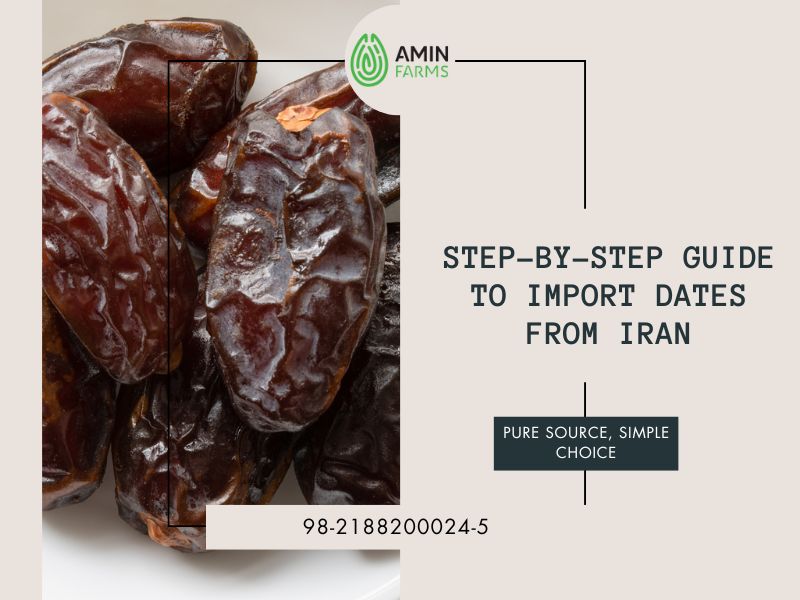
Successfully importing dates from Iran goes far beyond simply placing an order and waiting for delivery. It’s a structured journey that demands precision, familiarity with trade regulations, and a clear grasp of your market’s needs. In the following section, we’ll guide you step by step to avoid common pitfalls and secure a premium-quality shipment.
1. Market Research and Product Selection
The first step is always research. Study the demand in your destination market: which Iranian varieties sell best there, Mazafati, Piarom, Kabkab, or others? Identify the appropriate packaging format — whether bulk or retail-ready — and define the quality standards your buyers expect. This groundwork will guide every decision you make later in the process.
2. Finding and Vetting Iranian Suppliers
Your supplier is your most important partner. Look for them through chambers of commerce, trade fairs, or trusted industry platforms. Always verify their track record, export certifications (HACCP, ISO), and their ability to meet international shipping standards such as Incoterms. A reliable partner means fewer risks and smoother operations.
3. Negotiating Terms and Documentation
Once you’ve chosen a supplier, negotiate the basics clearly: pricing terms (FOB or CIF), delivery schedules, and payment conditions. Request a Proforma Invoice and ensure the supplier is prepared to provide all required documents, including the Certificate of Origin, Packing List, and Phytosanitary Certificate. These papers are essential for customs clearance.
4. Essential Documents and Regulations
Documentation is the backbone of the entire process. You’ll need a Phytosanitary Certificate to prove product safety, a Certificate of Origin to confirm the dates, plus the Bill of Lading and Commercial Invoice. It’s equally important to understand the food safety and tariff regulations in your destination country, whether it’s FDA standards in the U.S. or EU rules in Europe.
5. Logistics and Shipping Arrangement
Dates are temperature-sensitive, so logistics must be handled carefully. Depending on your agreement, you may need refrigerated (reefer) transport. Coordinate with specialized shipping companies, arrange pre-shipment inspections, ensure your cargo, and decide between sea or air freight based on your budget and delivery timeline.
6. Customs Clearance and Final Delivery
At the final stage, a skilled customs broker can save you time and money. Proper submission of all documents ensures smooth clearance and avoids unnecessary delays or penalties. Once customs is complete, your shipment is inspected for quality one last time before heading to your warehouse or directly to your customers.
Discover more: Iran Dates Suppliers
Top Iranian Date Varieties for International Buyers
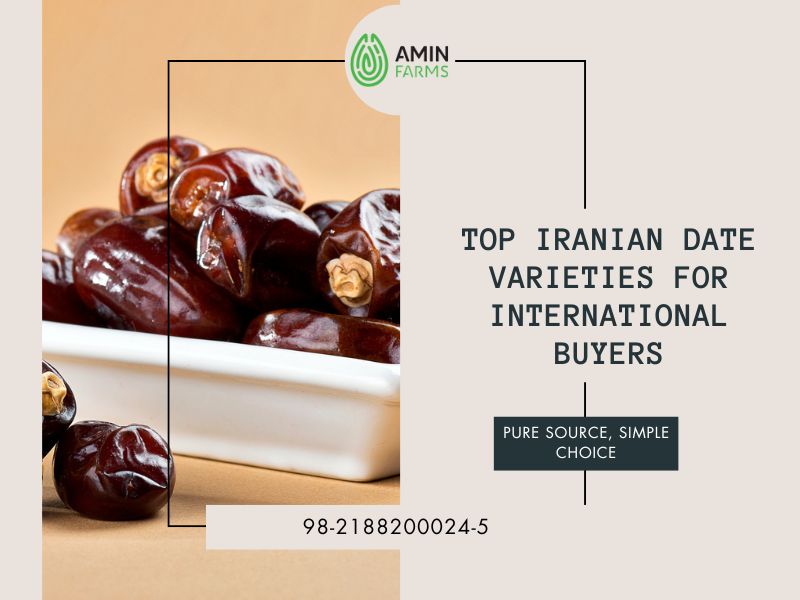
Iran stands proudly as one of the world’s leading producers of dates, offering an incredible variety of this nutritious and flavorful fruit to global markets. Each export variety has its own unique texture, sweetness, and moisture, making them suitable for different tastes and uses. From soft, juicy dates, perfect for fresh snacking, to semi-dry varieties ideal for long-term storage and international shipping, Iranian dates carry a reputation for authenticity and quality that resonates worldwide. For importers and distributors, knowing these top varieties is the key to choosing the right product for their market.
1. Mazafati Dates
Grown mainly in Bam, Mazafati dates are among the most famous varieties worldwide. With its dark black skin, soft, moist flesh, and caramel-like sweetness, it’s a favorite for fresh consumption. Due to its high moisture, it typically requires refrigerated storage.
2. Piarom Dates
Often called the “chocolate date” and recognized as Iran’s most luxurious variety, Piarom dates grow in the foothills of Hormozgan. Semi-dry, elongated, with thin skin clinging to the flesh, Piarom offers balanced sweetness and excellent shelf life, making it perfect for premium exports to Europe and high-end markets.
3. Zahedi Dates
Distinguished by their golden-yellow to light brown color and oval shape, Zahedi dates are dry to semi-dry with a firm texture and mild sweetness. They’re easy to store and transport, making them a practical and affordable option, particularly for the food industry.
4. Kabkab Dates
Cultivated in Bushehr and Fars, Kabkab dates are semi-moist, dark brown, and medium to large in size. Known for their rich sweetness and affordability, they are especially popular in price-sensitive international markets.
5. Rabbi Dates
Produced mainly in Sistan and Baluchestan, Rabbi dates are a semi-dry variety with elongated black fruit and naturally high shelf life. Less dependent on cold storage, they are excellent for long-distance sea shipments and are gaining popularity across Asia and the Middle East.
From Mazafati to Piarom: What to Choose?
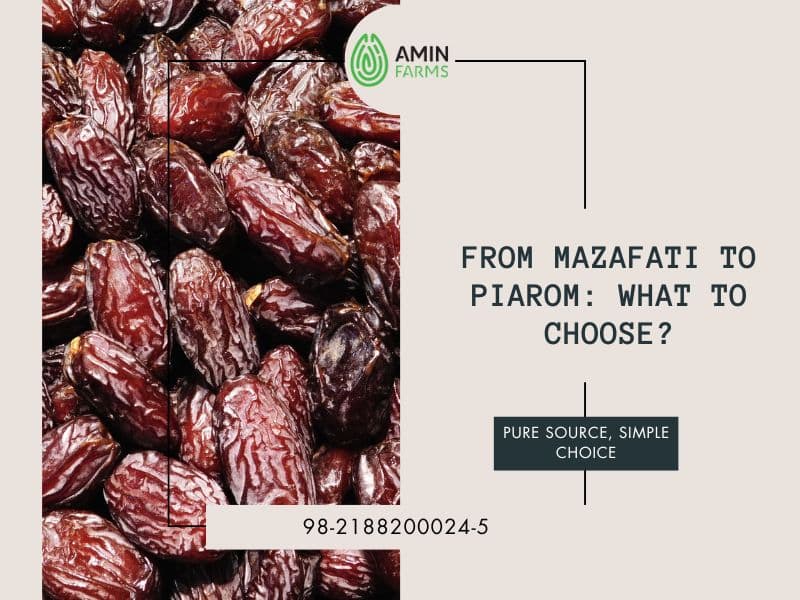
Choosing between Mazafati and Piarom largely depends on your export goals and your target market’s expectations. Mazafati, with its soft, juicy texture and deep dark color, is a fresh date variety beloved for its rich, caramel-like sweetness. It’s the perfect match for markets that value immediate consumption and the pleasure of a moist, melt-in-your-mouth fruit, common in neighboring and Asian countries. The trade-off, however, is that Mazafati requires careful handling, a cold chain, and consistent refrigeration.
Piarom, on the other hand, tells a different story. This semi-dry, premium variety, often called the “luxury date”, has a firmer, leathery texture, a long, elegant shape, and a more balanced sweetness. Because it keeps well for more extended periods and demands less strict refrigeration, Piarom is ideal for long-distance exports to Europe and North America. It also appeals to customers who seek not just flavor, but sophistication and durability in their product.
In short, if your market values freshness and affordability, Mazafati is your go-to choice. If prestige, longevity, and high-end positioning are the priorities, Piarom takes the crown. For anyone planning to import dates from Iran, understanding this distinction helps ensure the right variety reaches the right consumers.
Discover more: Mazafati Iran Dates Suppliers
Finding Reliable Suppliers in Iran
Finding a reliable supplier is the backbone of every successful date business. Buyers need partners who not only have direct access to orchards and a wide range of varieties, such as Mazafati, Piarom, and Zahedi, but also meet international packaging standards, hold global quality certifications such as HACCP and ISO, and can arrange temperature-controlled transport. Transparent pricing, a firm commitment to quality, and a proven track record in customs clearance are equally important factors to consider.
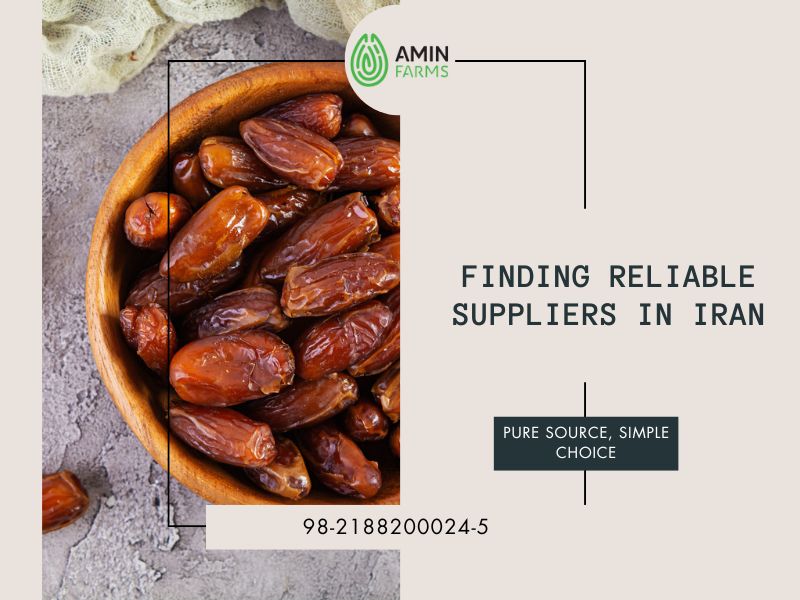
What truly minimizes risk, though, is working with a partner who oversees the entire supply chain, from harvest to final loading. This level of control ensures consistency, reduces surprises, and builds long-term trust. Amin Farms is a well-recognized supplier in Iran that has earned the confidence of international buyers by focusing on direct sourcing of premium-quality dates. With deep expertise in processing and packaging tailored to global market needs, the company has become a trusted link in the worldwide date supply chain.
For anyone planning to import dates from Iran, collaborating with a supplier like Amin Farms is more than a business decision; it’s a wise investment in reliability and peace of mind.
Costs and Logistics for Global Imports
Importing dates involves more than just the purchase price. Costs include sea or land freight, export-standard packaging, insurance, and customs duties. Logistics are critical: moist varieties like Mazafati require refrigerated containers (reefers), which raise expenses but preserve freshness. Semi-dry types such as Sayer and Piarom can travel at regular temperatures, lowering costs and making long-distance shipping more economical. Import tariffs and destination clearance fees also affect the final price. For companies planning to import dates from Iran, understanding these key factors ensures accurate budgeting, smoother trade operations, and more substantial profit margins.
Quality Assurance Tips for Imported Dates
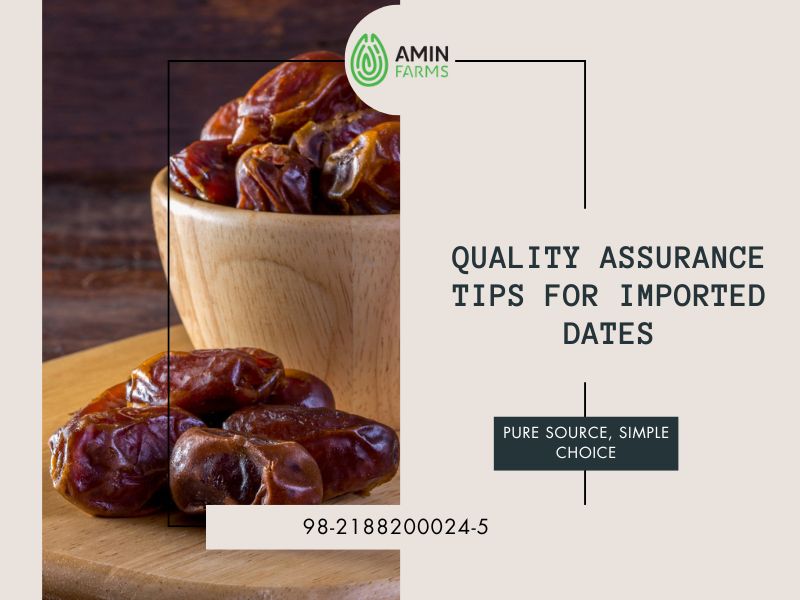
Ensuring top-quality dates is key to satisfying customers and protecting your investment. When importing dates, international buyers should pay attention to these essential steps:
- Work with suppliers holding international certifications such as HACCP and ISO 22000, supported by official Iranian health documents.
- Conduct random pre-shipment sampling to check size, color, texture, moisture, and to ensure there is no mold or pests.
- Use sturdy, hygienic packaging; for moist varieties like Mazafati, employ refrigerated containers (0–5 °C) with data loggers to monitor temperature.
- Label packaging clearly with harvest and expiration dates.
- Re-inspect shipments upon arrival, comparing them to initial samples to confirm consistency and quality.
Best Time to Import: Iran Date Harvest Calendar
Timing your imports just right can make all the difference when bringing Iranian dates into your market. Understanding the harvest seasons isn’t just about logistics—it’s your key to locking in the freshest products at the best prices, before storage fees kick in. This calendar helps you plan, ensuring you get premium quality while keeping costs in check.
Why Seasonality Matters for Price and Freshness
Dates thrive on nature’s schedule, and aligning your orders with harvest times means fresher fruit, lower prices, and happier customers.
The best time for importing dates from Iran is:
- August to September: The season kicks off with juicy, fresh varieties like Mazafati from the Bam region and early Zahedi dates. This is prime time to pre-book and snag those fresh, high-moisture loads straight from the trees.
- October to November: Things heat up with premium dry and semi-dry options, including luxurious Piarom and versatile Sayer. It’s ideal for stocking up on items with longer shelf life that travel beautifully.
- December Onwards: Supplies shift to cold storage, where modern refrigeration maintains top-notch quality. Prices might nudge up a bit to cover those costs, but the reliability is worth it for year-round availability.
Why Iran Leads in Date Exports Worldwide?
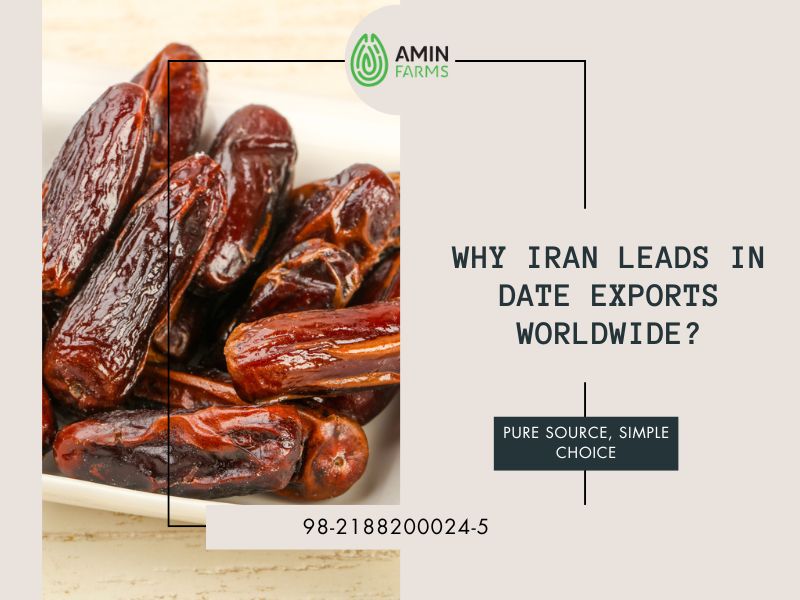
Several factors have made Iran a global leader in date exports. First, the country’s diverse climate allows for the cultivation of dozens of unique date varieties, ranging from soft, juicy dates to semi-dry types with extended shelf life. Second, the centuries-long experience of Iranian farmers ensures exceptional quality, earning worldwide praise for flavor and nutritional value.
In addition, Iran produces dates in high volumes and offers competitive pricing, especially for popular varieties such as Sayer and Kabkab. Companies like Amin Farms strengthen this advantage by sourcing premium dates directly from growers and adhering to international standards for processing and packaging. Their efforts play a crucial role in connecting local producers with global markets, making it easier and more reliable for businesses worldwide to import dates from Iran.
Government Incentives and Support for Importing Dates from Iran
Iran’s government bolsters date imports through export incentives, indirectly benefiting international buyers with stable supply and competitive pricing. Programs under the Ministry of Agriculture drive 5-10% growth in exports, ensuring adherence to standards like EU MRLs.
- Export Rebates: 10-15% subsidies on freight for certified shipments; lowers landed costs for bulk buyers.
- Trade Agreements: Preferential tariffs via FTAs with Eurasia/Asia; reduces duties by 5-20% for Iranian dates.
- Quality Funding: Grants for HACCP/ISO upgrades; ensures compliant products for global markets.
- Market Promotion: Subsidized participation in fairs like Anuga; facilitates buyer-supplier connections.
- Financing Schemes: Low-interest export credits; stabilizes pricing for long-term bulk contracts.
